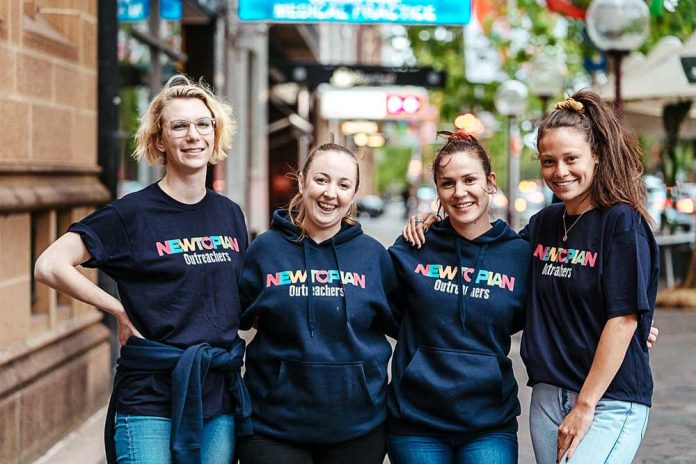NEWTOWN: Just a simple phone call was all that was needed to help vulnerable members of a community stay connected while in lockdown during the coronavirus pandemic.
The Newtown Neighbour Centre (NNC) has been running its Newtopian Outreachers program for over three years now.
As part of this program, volunteers take to the streets to reach out to rough sleepers every month, engaging with them and offering assistance.
However, when Australians went into lockdown at the beginning of 2020, NNC had to shut down this service for several weeks.
Karen Hunter, Homelessness Services Coordinator for the program, said that this resulted in a greater demand on their case managers to connect with vulnerable people in boarding houses who were feeling isolated.
“We noticed that our other service users who were people that were vulnerable, especially older people living in boarding houses, became incredibly isolated,” she said.
“In boarding houses, people generally live in a room. It’s pretty small. They have to share bathrooms and kitchens, putting them at quite an increased risk.”
NNC decided to redeploy their Newtopian Outreachers and asked them to make social calls via the phone.
“They were making calls and checking in weekly. We paired them up with somebody and then that would be their buddy,” Ms Hunter said.
“And then they would ring them every week or a couple of times a week just to check in on them and see how they were doing.”
The volunteers would check to see what people needed and provide them with information about Covid-19 and how to keep themselves safe.
This initiative received a lot of positive feedback from their clients, who really enjoyed the person-to-person contact.
“We did a review afterwards to see how beneficial it was and what people liked about it,” Ms Hunter said.
“They said it was just to have a conversation with another person and to know that someone was there that they could chat with and relieve some of that sense of isolation.”
NNC found that even its volunteers benefitted from this set up.
“Volunteers actually said things like they were getting just as much out of the conversations as they thought the person was, and they found they had a lot of common ground,” Ms Hunter said.
“And they found out lots about the person that they were ringing, and those people had really long and interesting lives, it was such a great two-way benefit.”
When restrictions eased, the volunteers went back on the streets again, where they continued their normal work of informing people about their housing options but also informed them of Covid-19 precautions.
NNC was concerned that volunteers wearing a mask would act as a barrier to their work.
“Because it’s such a human-to human-connection, and facial expression is so important in those interactions, we were wondering if it was going to alienate people, but people were pretty aware,” Ms Hunter said.
“I think us wearing masks helped highlight to them what was going on and that it was an important thing and they were glad that we were doing that and taking those precautions.”
This also gave them an opportunity to educate rough sleepers on the proper usage of masks.
“What we were seeing was, and we’re still seeing that now, is that some people on the street are, even though they’re on the street, they might have a mask,” Ms Hunter said.
“And they’re single-use masks but they’re using them repeatedly, so we always carry additional masks so they can change them.”
Ms Hunter has worked in this sector for a long time, but it never ceases to amaze her to see people who aren’t from the sector helping out.
“It’s fantastic because I think it’s everyone’s job to address homelessness, not just services but it takes a whole of community approach,” she said.
What it’s like to be a Newtopian Outreacher
I knew about the Newtown Neighbourhood Centre’s (NNC) work supporting some of our most vulnerable neighbours from the Newtown Festival, but what “supporting” meant was a mystery to me. I saw the Newtonian Outreachers program advertised in the local paper and it seemed like a great opportunity to learn more.
The program was designed for people with no background in homelessness or social work. NNC ran an excellent training program helping us get to help with the issue and the support services available. These systems are so complicated. It’s difficult to get your head around them at all. Imagine how much worse it would be if you were trying to figure it out while also not having somewhere safe and secure to sleep at night.
We go out each week as a group of volunteers led by a professional social worker. Our role has three parts: build relationships with local rough sleepers (so they feel more comfortable approaching NNC for support); provide information about services that may be available to support their immediate needs; and to pass messages and “intelligence” to and from the rough sleeper and support services (where the rough sleeper consents to this). It can lead to reconnecting someone with their case manager, or connecting them with case management for the first time.
Outreach groups always work in teams and, as volunteers, we can multiply the effect of the professional social worker.
For us, it’s a chance to get to know some of our most vulnerable neighbours, and make a real impact in their lives. It is so great when we hear that people we’ve met and got to know are now in a more stable living situation.





